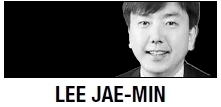
September is the busiest month for government agencies. An annual parliamentary audit and inspection of the government takes place for about a month. Ministers and other high ranking officials attend audit sessions and respond to questions and comments from National Assembly Members. This year’s session was officially scheduled to begin Sept. 26 and run until Oct. 19.
As regards the National Assembly overseeing governmental affairs, none would be a more effective and influential tool than the audit authority.
It is here that national policies are examined, adjusted and changed, and illegalities are unearthed and corrected. Some lawmakers shine in the national spotlight with thorough preparation and tough questions.
The parliamentary audit does not stop at governmental agencies. Under the law any entity where government funds or tax money is injected is subject to the audit requirement. At present, as many as 600-plus entities are covered. This year’s audit will look into 154 agencies among them.
This type of monthlong, pan-governmental, general inspection is not commonly seen in other countries. The current audit system was introduced in March 1988 through an amendment to the nation’s Constitution in late 1987.
Understandably, questions and comments from the lawmakers are usually harsh and rough. So much so that rumors sometimes swirl that heads of agencies or witnesses schedule overseas business trips as excuses not to attend. During an audit session last week, a head of an agency whispered a complaint during a break, which was overheard by a lawmaker. You can imagine what happened when the session resumed.
Here is the twist. The reach of the law in fact goes beyond the listed 600 entities. The law allows the National Assembly to call anyone to appear as a witness in one of the audit sessions. Thus, officials from non-covered entities are also required to appear if they are called. This explains why sometimes businessmen from the private sector and even CEOs from foreign corporations stationed in Seoul appear in audit sessions of the National Assembly. There are grounds to refuse to attend, but they are very narrow, such as national security concerns. More than anything, those summoned are afraid of the political repercussions from a non-appearance, as there are many strings for the National Assembly to pull.
From the perspective of inspected entities, the logistical burdens are anything but trivial. Document preparation and prep sessions occupy prior weeks before the actual audit. On the day of the audit, a head of an agency is accompanied by a large entourage: from vice ministers to director generals, to directors and to working level associate directors. In principle, it is only the head of an agency that is supposed to respond. When a question outside a prep session is presented, staff members are busy scribbling down answers and pass a note to the head. The logistical burden has worsened since governmental agencies and government-related institutions have been relocated to Sejong City and other parts of the country.
After all these efforts, a national audit has a short memory. Remarkably, few follow-up investigations or subsequent measures are taken or, if taken, shared. There is a website of the National Assembly summarizing an annual audit with corrective action from agencies involved, but the information there is too skeletal, at least too scant to justify all the fuss and logistical burden for about two months in the fall. As a matter of fact, only few remember what happened during a national audit, except for some high profile political debates.
For the conduct of a proper audit, a post-audit evaluation is a must. Detailed records should be prepared, even if some of them are not disclosed because of their sensitive nature, as to what questions were asked, why they were asked, and how the questions were responded to. People know about this only from news clips. And, most importantly, a lawmaker who raised a particular issue should be responsible for following it up including remedial action from an agency and any misperception on his or her part, if any. They should be placed on record.
By Lee Jae-min
Lee Jae-min is a professor of law at Seoul National University. — Ed







![[Weekender] Korea's traditional sauce culture gains global recognition](http://res.heraldm.com/phpwas/restmb_idxmake.php?idx=644&simg=/content/image/2024/11/21/20241121050153_0.jpg)
